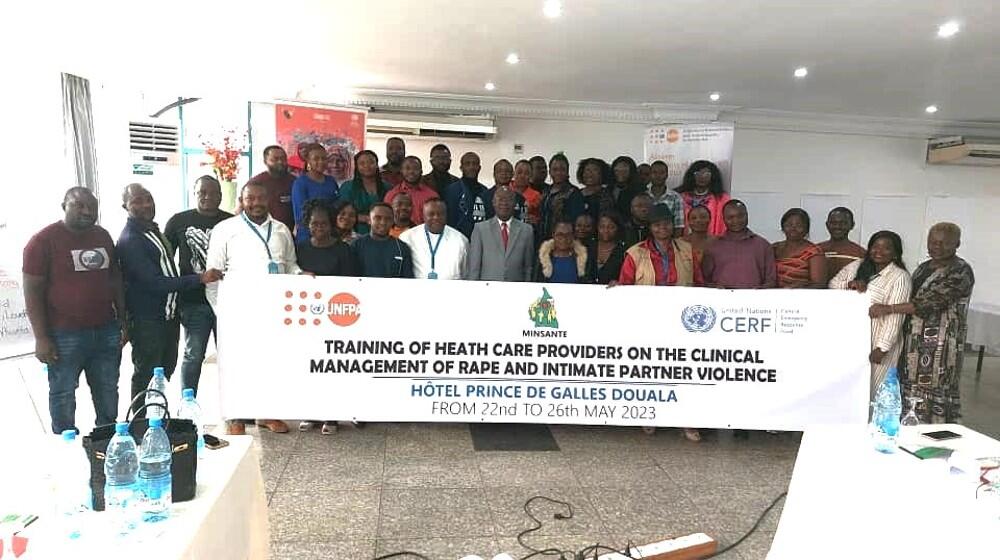Douala, Cameroon - 25 May, 2023 / 30 health care professionals, comprising of medical doctors, nurses and midwives, were drilled on medical care for Gender-Based Violence, with emphasis on the clinical management of rape and intimate partner violence. The training organised by UNFPA in collaboration with the Ministry of Public Health, held in Douala, falls in the framework of UNFPA’s humanitarian response towards ending Gender-Based Violence (GBV) in the North West and South West Regions presently hit by a humanitarian crisis.

operating in very challenging environments.
Photo credit: @UNFPACameroon, May 2023.
Health service providers are in a position to break the silence and offer critical care to women and girls who are victims of violence and suffer its health consequences for many years. Furthermore, they are often the ones who have the most contact with survivors. Yet health professionals often fail to identify patients experiencing abuse, and thus only treat the presenting complaints and miss an opportunity to provide the link to specialised GBV services.[1]
The 5-day refresher training was aimed at honing the skills and knowledge of participants on how best to provide survivor-centered care in applying the national medical protocol for sexual violence. This also included applying the World Health Organisation guidelines, recently revised in 2019 to include care for intimate partner violence in addition to clinical care for rape.
Participants were called to understand and apply the key GBV principles of confidentiality, respect, security and non-discrimination while providing medical care, psychosocial first aid, and ensuring safe referrals to other GBV services. This was also an opportunity to train them in the provision of medico-legal evidence to support legal proceedings when requested by the survivor as well as in the documentation and safe storage of information about the survivors. The training further gave room for participants to share best practices in dealing with child and adolescent survivors.
“Ensuring medical care for intimate partner violence survivors is critical and very timely in the present context of Cameroon. We have witnessed a nation-wide spike in feminicides in the past months with a lot of them stemming from intimate partner violence.” Lynda N., one of the participants. Indeed, according to the Ministry of Women Empowerment and the Family, the country has recorded about 30 cases of feminicides since January 2023. While these were reported due to their gruesome nature and quick access to communication services in some parts of the country, there is a rising worry from crisis regions as to the vulnerability of women and girls to such acts. The capacity of service providers to identify cases of intimate partner violence, and to offer the appropriate support would be a powerful prevention mechanism of the most horrific manifestation of domestic violence which is the killing of the intimate partner.

Coordinator, Mr. Aymar Narodar Some, chaired the
workshop on behalf of the Resident Representative
of UNFPA Cameroon. Photo credit:
@UNFPACameroon, May 2023.
The training on clinical mangement of rape and intimate partner violence enables a stronger implementation of the Minimum Initial Service Package (MISP) for Sexual and Reproductive Health (SRH).
The MISP is a series of crucial, lifesaving activities required to respond to the SRH needs of affected populations at the onset of a humanitarian crisis. It includes the procurement of post-rape and treatment kits as well as trainings of available service providers to equip them for service delivery to respond to survivor needs.
Since 2017, the North West and South West Regions have been hit by a humanitarian crisis, jeopardising availability of health care, education and other services, thus making the population more vulnerable. In this light, UNFPA is presently running a project aimed at providing “Comprehensive life-saving GBV/SRH services to affected women and girls in the North West and South West Regions of Cameroon.” The project benefits from a 6million USD funding from the United Nations Central Emergency Response Fund (CERF), 10% of which has been allocated to GBV prevention and response with no allocations to health care.
“In ending sexual violence in emergencies, we must ensure survivor-centered medical care alongside lifesaving and quality services for all sexual and reproductive health needs” said Mr. Aymar Narodar Some, UNFPA Humanitarian Programme Coordinator in Cameroon, while explaining the fundamental linkages between the GBV protection response and the sexual and reproductive health one. In 2022, the GBV AoR-coordinated response barely reached 25% of its financial demands. This stands as a huge indicator of the crisis dire need of ressources for GBV prevention and response in 2023.
[1] IMPLEMENT Training Manual on Gender-Based Violence for health professionals, Austrian Women’s Shelter Network 2015


